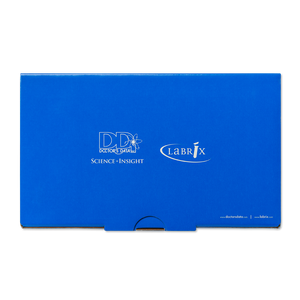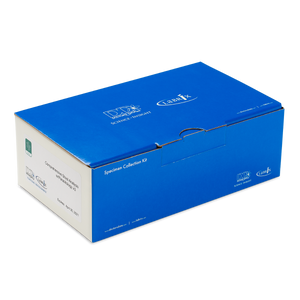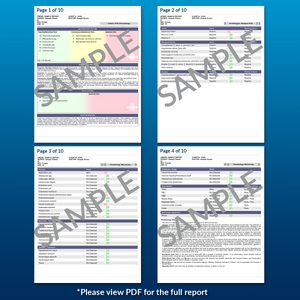



Are you under high stress, experience digestive issues or unexplained body pain, brain fog, low energy or headaches? If you're doing your best to live a healthy lifestyle but continue to feel unwell, an imbalanced gut microbiome could be to blame. While trillions of microorganisms are found in our gut, it's possible for them to fall out of their homeostatic limits. What's more, we can acquire microorganisms that shouldn't be present in our body. This simple lab takes a comprehensive look at key gut bacteria and parasite markers to identify any possible underlying imbalances.

If you experience ongoing digestive or gastrointestinal issues, your daily routine can be severely disrupted. Your GI tract is the internal interface between you and the rest of the world. Anything that compromises its integrity and healthy function exposes you to a host of issues like inflammation and microbial imbalance, which can include abdominal cramps, diarrhea or constipation, bloating, gas, headaches, nausea or vomiting. Leaving suspected GI issues unaddressed can lead to a number of symptoms and more serious health conditions down the road. It's crucial to identify the root cause of your symptoms so that you can improve your gut health and ultimately achieve better balance and wellbeing. This easy at-home lab is an important test to complete for anyone with bowel or GI related issues by taking a comprehensive look at key markers of gut bacteria and parasites to identify any imbalances.
If you've been experiencing ongoing gut issues, this simple at-home lab test will provide answers to what may be causing the symptoms. It takes a comprehensive look at parasites, yeast and bacterial imbalance measured by the microscopy, antigens, cultures and occult blood in your gastrointestinal tract. This test will help pinpoint the causes of gastrointestinal symptoms and other chronic conditions by measuring key markers of digestion, absorption and inflammation and working with a Health Coach based on your results, you can then take necessary steps to better gastrointestinal health.
Looks closely at microbial balance or imbalance
Expected/beneficial bacterial flora: make up a significant portion of the total microflora in a healthy & balanced GI tract. It is important to identify any overgrowth or undergrowth of good or bad bacterial flora. Beneficial bacteria are expected as they have many health-protecting effects in the gut including manufacturing vitamins, fermenting fibers, digesting proteins and carbohydrates, and propagating anti-tumor and anti-inflammatory factors.
Dysbiotic bacterial flora: are known pathogenic bacteria that have the potential to cause disease in the GI tract. They can be present due to a number of factors including: consumption of contaminated water or food, exposure to chemicals that are toxic to beneficial bacteria; the use of antibiotics, oral contraceptives or other medications; poor fiber intake and high levels of stress.
Normal and dysbiotic yeast: while normally present in small quantities, high levels of yeast is considered abnormal and can contribute to bloating or skin issues. High levels of yeast colonization is associated with several inflammatory diseases of the GI tract.
Identifying potential intestinal parasites
Intestinal parasites are abnormal inhabitants of the gastrointestinal tract that have the potential to cause damage to their host. If left untreated, chronic parasitic infections can cause damage to the intestinal lining and can be an unsuspected cause of illness and fatigue. Chronic parasitic infections can also be associated with increased intestinal permeability, irritable bowel syndrome, irregular bowel movements, malabsorption, gastritis or indigestion, skin disorders, joint pain, allergic reactions, and decreased immune function.
Protozoa (tiny cell like parasites)
Nematodes (Roundworms)
Cestodes (Tapeworms)
Trematodes (Flukes)
Looking closely at potential inflammation markers
Yeast is hard to culture on a stool sample, so the lab is looking at the yeast culture under a microscope–high levels of yeast colonization is associated with several inflammatory diseases of the GI tract
Red Blood Cells (RBC) in the stool may be associated with a parasitic or bacterial infection, or an inflammatory bowel condition such as ulcerative colitis. Colorectal cancer, anal fistulas, and hemorrhoids should also be ruled out.
White Blood Cells (WBC) and Mucus in the stool can occur with bacterial and parasitic infections, with mucosal irritation, and inflammatory bowel diseases such as Crohn's disease or ulcerative colitis
Muscle fibers in the stool are an indicator of incomplete digestion. Bloating, flatulence, feelings of "fullness" may be associated with increase in muscle fibers.
Vegetable fibers in the stool may be indicative of inadequate chewing, or eating "on the run".
Charcot-Leyden Crystals: structures found in white blood cells that provide indirect evidence of parasitic infestation.
Pollen: Specific pollen may lead to gastrointestinal upset by local allergic inflammation in the small intestine.
Pathogenic Parasites and Bacteria
Cryptosporidium (C. parvum and C. hominus): Cryptosporidium is a parasite that causes a diarrheal illness. Infection is spread by contaminated drinking water and occasionally food sources, which may cause significant outbreaks of diarrhea.
Giardia Duodenalis: Giardia lives in the intestines of infected humans or animals. Contamination with Giardia from soil, food, water, or surfaces can occur from contact with feces from infected sources.
Helicobacter Pylori (H.Pylori): A type of bacteria that infects your stomach. It can damage the tissue in your stomach and the first part of your small intestine (duodenum). This can cause redness and soreness (inflammation). In some cases it can also cause painful sores (peptic ulcers) in your upper digestive tract.
Detecting Intestinal Inflammation and Poor Nutrient Absorption
Digestion/absorption markers
Inflammation Markers
Short Chain Fatty Acid Markers
Occult Blood (microscopic blood in the stool)
EquiLife labs are designed to provide detailed and thorough information so that you can understand your health at the deepest level, allowing you to finally get to the root cause of your biggest health concerns.
To ensure you feel confident about your lab findings, EquiLife provides a complimentary, one-on-one call with a certified Health Coach who will review your results with you in-depth and answer any questions you have.
Testing takes the guesswork out of your health and empowers you to make informed choices about your health. After reviewing your results, Health Coaches will provide recommendations to help you achieve your goals.
Get to the Root Cause
Once you receive your at-home lab test, please follow the instructions provided to register your test. Once sample(s) are sent to one of our CLIA certified labs, it will take approximately 3 weeks for your results to be returned, during which time you will receive information on how to schedule your one-one-one health coaching call.
All at-home lab tests expire 6-months from their purchase date. To ensure you will receive your results, please be sure to send all samples for completed lab tests prior to the 6-month expiration date. Unfortunately, there can be no returns or replacement lab tests sent after the 6-month time frame.
Please remember to register your labs prior to sending your sample to the laboratory.
We have compiled thorough FAQs for our at-home lab tests, which you can browse here:
https://faq.equi.life/en-US/articles/lab-kit-faq-14490.
For additional questions, you can contact us at support@equi.life.



